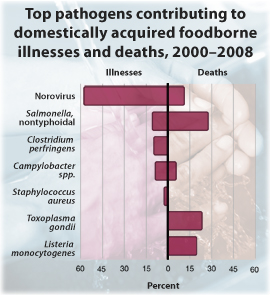Hey Dr. Zoomie – what’s the big deal with food irradiation? Is it safe, or is going to turn me into a lizard or something?
My mother used to work as an epidemiologist, investigating outbreaks of food poisoning. She told me once that if all food was irradiated her job would be mostly checking up on people who left their potato salad out too long at picnics. Food irradiation has been in use for over a half-century – it looks to be a pretty effective way to help make food safer. But first, let’s back up a little bit to talk about how it works.

High levels of radiation are dangerous, not only to humans, but to microbes as well. The idea is that blasting, say, a pound of ground beef with withering doses of radiation should kill off any microbes that might otherwise make us sick. Many microbes are fairly hardy, thought, when it comes to radiation – we have to expose the food to very high doses of radiation to make sure it’s sterilized; doses that would be fatal to humans many times over.
There are a few ways to produce such a high radiation dose. One way is to use extremely high levels of radioactivity and the other is to use very high-energy electrons to create x-rays or to directly irradiate the food. The last of these – directly bombarding food with high-energy electrons – is fairly simple; the electrons hit the microbes and kill them. The problem is that even the highest-energy electrons can only penetrate about a half inch into food – anything that’s more than about an inch thick (since it can be irradiated from both sides) will have area that can’t be reached by the electrons. The other methods – using gamma rays or x-rays – are a bit more effective since these can penetrate all the way through fairly thick foods to reach every bit of them.

So the radiation can penetrate into the food to make it safe, but a lot of people are concerned that the treatment itself might affect the food, making it unsafe. The thing is, these worries are unfounded – the benefit from killing off hostile microbes (such as the E. coli and salmonella that have caused a number of food poisoning outbreaks) far exceeds any negative effects. Here’s why.
First, irradiated food does not become radioactive – in fact, irradiating anything with gamma rays, x-rays, or even electrons is physically unable to cause things to become radioactive. Think about the lights in your home – when you turn the lights off at night your furniture doesn’t glow with the stored energy. And when you get off the table after having an x-ray taken you’re not emitting radiation either – just as food irradiation doesn’t make your food radioactive.
That’s not to say that there aren’t any chemical changes in your food when it’s irradiated. Radiation is known to cause chemical changes – it’s the whole subject of the field of radiochemistry. As one example, radiation exposure can cause chemical bonds to break, turning water into a mixture of hydrogen and oxygen. Other chemicals can form as well – especially in foods that are fatty or oily. But you have to remember that cooking also causes chemical changes in food – especially barbequing and grilling out. So the question shouldn’t be “Does irradiation cause chemical changes in the food” so much as “How do the chemical changes caused by irradiation compare to those caused by cooking?” And when it comes down to it, while food irradiation dose cause small chemical changes in the food, they pale in comparison to what happens when you put food on the grill. The bottom line is that food irradiation has been tested for over a half-century – and has been in use for about that same amount of time – and no credible studies have shown it to be any more dangerous than regular cooking.
It’s easy to say that food something is safe but somewhat more difficult to prove it. In this case, food irradiation has been studied extensively by the International Atomic Energy Agency and by the US General Accountability Office (editor’s note: link removed, no longer accessible) – both reputable organizations. These studies were pretty clear that food irradiation is safe and that the benefits far outweigh the risks. There have been some who have challenged these findings, but the science is not on their side.

The bottom line is that food poisoning harms and kills people every year. How many times have we heard about illness linked to tainted chicken, ground beef, or farm vegetables, and how many people have died from these outbreaks over the years? By comparison, irradiated food hasn’t killed anybody, and there’s no telling how many people it’s saved.